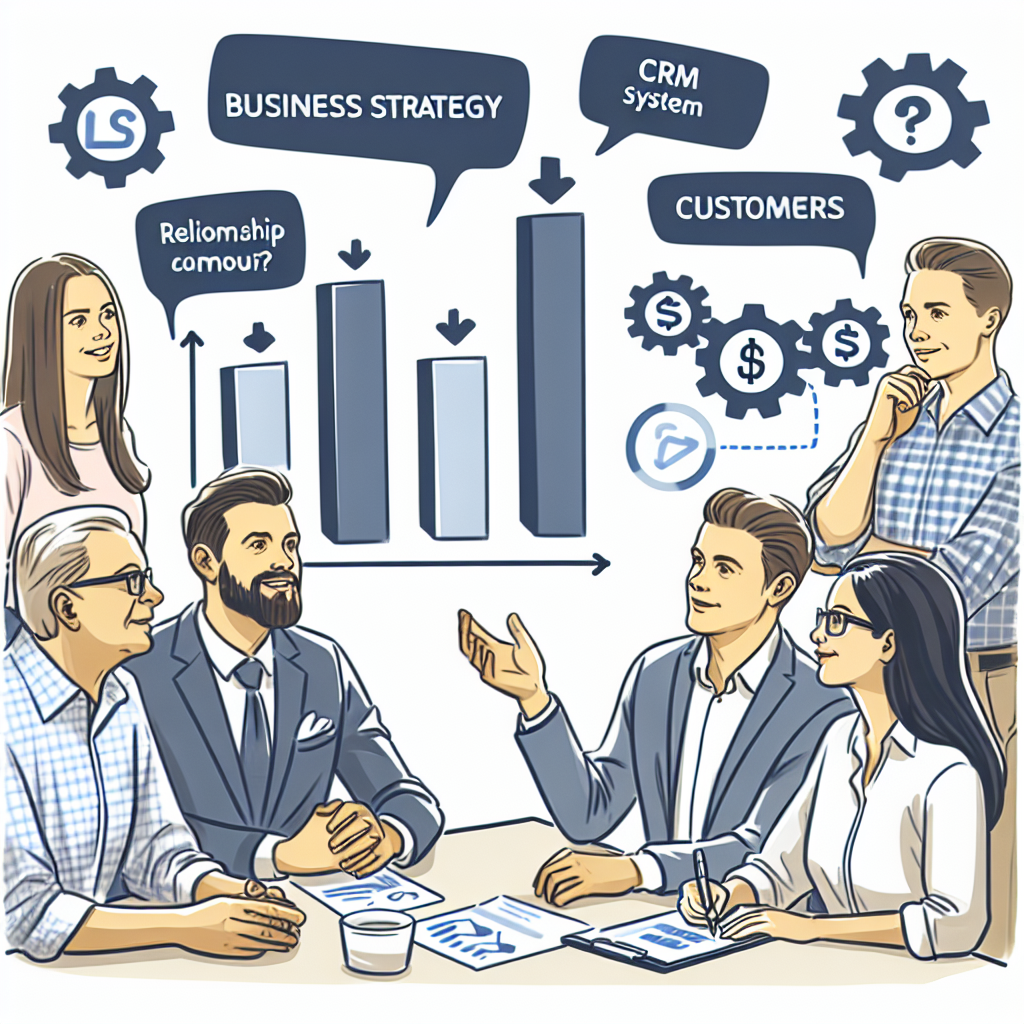Comprehensive CRM Systems for Retail and Wholesale Stores

How a Tailored CRM for Retail Store Transforms Customer Experience and Boosts Sales

Imagine walking into your favorite retail store, greeted by name and presented with personalized offers tailored just for you. This is not just a dream; its the power of a tailored CRM for retail store in action! Customer Relationship Management (CRM) systems have revolutionized the way retail businesses interact with their customers, leading to higher satisfaction and increased sales. But how exactly does it work?
Understanding the Value of a Tailored CRM
A tailored CRM for retail store helps you collect and analyze customer data from various sources. Whether it’s past purchases, browsing behavior, or demographics, the right CRM system can create a comprehensive profile for each customer. When you understand your customers better, you can cater to their needs more effectively. For instance:
- ⭐ 65% of customers want personalized experiences, and a tailored CRM can deliver just that.
- ⭐ Retailers using advanced CRM systems have reported sales boosts of up to 30%!
Real Stories of Transformation
Let’s consider the story of a local bakery named “Sweet Delights.” Before implementing a CRM system for wholesale and retail management, they struggled to keep track of customer preferences and order histories. After using a tailored CRM, they managed to create personalized discount codes based on individual buying habits. This increased customer loyalty, with repeat visits increasing by over 40% within just three months!
Another example comes from a clothing store in the heart of the city. By leveraging a CRM for retail store, they set up an automated system that sent birthday discounts to customers. Not only did this little gesture boost sales, but it also enhanced customer relationships, making shoppers feel valued and appreciated.
How to Implement a CRM System for Your Retail Business
Launching a CRM system in your retail business doesnt have to be complicated. Here’s how you can smoothly make the transition:
- ⭐ Choose the Right CRM: Research and pick a system that is user-friendly and offers features tailored to your retail needs.
- ⭐ Integrate with Existing Systems: Ensure your new CRM seamlessly integrates with your point-of-sale (POS) systems and inventory management tools.
- ⭐ Training Staff: Invest time in training your employees to use the CRM effectively to maximize its benefits.
Expert Advice for a Successful CRM Transition
Alexandra, our customer relations manager, emphasizes the importance of client engagement during the CRM integration process. “The key to a successful CRM is not just in technology but in how well you connect with your customers,” she explains. Make sure to communicate changes transparently to your customers for a seamless transition.
Benefits of Using a Tailored CRM
Utilizing a tailored CRM for retail store comes with numerous benefits, including:
- ⭐ Improved customer segmentation
- ⭐ Enhanced sales forecasting
- ⭐ Effective marketing campaigns based on customer behavior
- ⭐ Increased retention rates through personalized communication
| Benefit | Impact |
|---|---|
| Personalized Marketing | Higher CTR by 20% |
| Customer Segmentation | Better-targeted campaigns |
| Sales Forecasting | Improved revenue predictions |
| Customer Retention | Decreased churn rate by 15% |
| Loyalty Programs | Increased repeat purchases |
| Customized Offers | More effective promotions |
| Feedback Management | Improved service quality |
| Data Analytics | Strategic business decisions |
| Integration with E-commerce | Smoother customer journey |
| Enhanced Reporting | Better insights into performance |
The right CRM system not only meets your current needs but also scales as your business grows. Ready to transform your retail experience? Dont hesitate! Reach out to us today at [email protected] or visit artivale.com to get started on your journey to better customer relations and boosted sales with a tailored CRM for retail store.
Frequently Asked Questions
-
What is a CRM for retail store?
A CRM for retail store is a management system designed to help businesses track interactions with customers, understand their preferences, and optimize sales strategies. -
How does a CRM system benefit my retail business?
It helps in personalizing customer experiences, managing sales pipelines, and improving customer service, ultimately leading to higher sales. -
Can a CRM integrate with my current systems?
Yes, most modern CRMs are designed to integrate seamlessly with existing sales and marketing tools. -
How quickly can I implement a CRM?
Implementation timelines vary, but many businesses can start seeing benefits within a few months, depending on the complexity. -
What type of data can I collect using a CRM?
You can gather data on customer purchase habits, preferences, feedback, and interactions, which all help tailor your marketing and sales approaches. -
What if my retail store needs customized solutions?
A tailored CRM can be developed to better fit your specific business needs, ensuring maximum effectiveness. -
How does CRM improve customer service?
With detailed customer profiles, your staff can provide more personalized and prompt service, increasing satisfaction. -
Are mobile CRM options available?
Yes, many CRM systems offer mobile access, allowing you to manage customer interactions on-the-go. -
Is training necessary for the team?
Absolutely, proper training ensures that your staff is equipped to use the CRM effectively, maximizing its benefits. -
How much will it cost to implement a CRM?
The cost can vary depending on your chosen system and customization needs; our basic CRM development starts at €6000.
What You Need to Know About Implementing a CRM System for Wholesale and Its Benefits for Your Retail Business

Are you ready to revolutionize your retail business? Implementing a tailored CRM system for wholesale can be a game changer! This powerful tool not only streamlines operations but also enhances your relationship with customers and suppliers alike. Lets dive into the essentials of implementing a CRM system and the numerous benefits it brings to your retail business.
Understanding CRM Systems in Wholesale
A CRM system for wholesale is specifically designed to manage business relationships and interactions with customers and suppliers. This system gathers critical data, automates processes, and offers analytical insights to support decision-making. Here’s how it can help your retail business:
- ⭐ Better Customer Insights: A CRM allows you to track customers purchase histories, preferences, and behavior patterns.
- ⭐ Seamless Integration: It integrates with existing supply chain and inventory management systems for real-time data on stock levels and customer needs.
- ⭐ Enhanced Communication: Automate communication with suppliers and customers for timely updates, order confirmations, and promotions.
Key Steps to Implementing a CRM System
Your journey towards implementing a CRM system for wholesale starts with a well-structured plan. Here are the key steps:
- ⭐ Assess Your Needs: Identify the specific needs of your business. What challenges are you facing? How can a CRM improve your processes?
- ⭐ Choose the Right CRM: Research various solutions available in the market. Look for features that align with your business goals.
- ⭐ Data Migration: Transition your existing customer and supplier data into the new CRM while ensuring accuracy and completeness.
- ⭐ Train Your Team: Provide comprehensive training to your staff on how to use the CRM effectively. Their comfort with the system is crucial for success.
- ⭐ Monitor and Optimize: Once implemented, regularly analyze the performance of the CRM system and make necessary adjustments to enhance its effectiveness.
Benefits of a CRM System for Your Retail Business
Investing in a CRM system offers a plethora of benefits that can elevate your retail operations:
- ⭐ Improved Customer Service: With access to detailed customer profiles and history, your team can provide personalized experiences, boosting customer satisfaction and loyalty.
- ⭐ Streamlined Processes: Automating repetitive tasks allows your team to focus on value-added activities, improving efficiency.
- ⭐ Data-Driven Decision Making: Access to analytics and reporting tools helps you make informed decisions based on customer behavior and market trends.
- ⭐ Enhanced Collaboration: A centralized database facilitates better collaboration among departments, ensuring that everyone is on the same page.
- ⭐ Increased Sales Opportunities: By nurturing customer relationships and understanding their needs, you can identify upselling and cross-selling opportunities more effectively.
Success Stories from Retailers
Let’s look at some real-life scenarios of retailers who embraced a CRM system for wholesale:
Consider a furniture store that was struggling with long order processing times and customer inquiries. After implementing a tailored CRM solution, they were able to reduce processing times by 50%. Customers reported significantly improved service, leading to a 30% increase in repeat business within the first six months!
Then there’s a local electronics retailer that leveraged a CRM to better communicate with suppliers. By automating their order system, they secured more favorable terms with suppliers, drastically reducing overhead costs while improving stock availability. The result? A boost in customer satisfaction ratings and a 25% increase in sales over the following quarter!
Common Challenges and Solutions
While the advantages are clear, implementing a CRM system for wholesale can come with challenges. Here are some typical hurdles and solutions:
- ⭐ Resistance to Change: Employees might be hesitant to adopt the new system. Solution: Engage them early in the process and highlight the benefits.
- ⚠️ Data Accuracy: Inaccurate data can lead to poor decision-making. Solution: Regularly audit data entries and train staff on proper data management.
- ⭐ Integration Issues: Sometimes, integrating with existing systems can be complicated. Solution: Work with your CRM provider to ensure smooth integration.
Getting Started with Artivale
At Artivale, we offer a comprehensive range of services to help you implement a tailored CRM system for wholesale. With over 20 years of experience, our professional specialists will guide you through every step of the process. Why manage multiple vendors when you can have everything in one place? Let us handle your CRM needs while you focus on growing your business!
Ready to elevate your retail business? Call us today at [email protected] or visit artivale.com to get started!
Frequently Asked Questions
-
What is a CRM system for wholesale?
A CRM for wholesale helps manage customer and supplier relationships and automates communication processes. -
How will a CRM improve my retail operations?
It streamlines processes, enhances customer insights, and improves overall efficiency. -
How long does it take to implement a CRM system?
Implementation time varies but can take from a few weeks to several months, depending on complexity and customization. -
What kind of training is needed for my team?
Comprehensive training sessions on the CRM software are essential for ensuring your team can utilize it effectively. -
Can I customize the CRM system?
Yes, most CRM systems offer customization options to fit your unique business needs. -
Is data migration difficult?
It can be tricky but with proper planning and support, it can be managed smoothly. -
How does a CRM help with customer retention?
By providing personalized experiences and easy communication, a CRM fosters loyalty and encourages repeat business. -
What features should I look for in a CRM for retail?
Look for customer segmentation, sales forecasting, and integration capabilities. -
How can a CRM enhance supplier relationships?
It allows for better communication and order management, leading to more favorable terms and relationships. -
What costs are associated with CRM implementation?
Costs vary widely based on the system features and customization; for example, development can start from €6000.
Breaking Myths: Why Every Retail Store Needs a CRM for Retail Store and What Happens When You Don’t

In today’s competitive retail environment, there’s no room for guesswork. A CRM for retail store isn’t just a luxury; it’s a vital component for success. Yet, misconceptions abound regarding its necessity. Let’s break down some common myths and clarify why a CRM system is essential—and what can happen if you choose to operate without one.
Myth 1: CRMs Are Expensive and Not Worth the Cost
One of the biggest misconceptions about CRM systems is that they are prohibitively expensive. In reality, a tailored CRM for retail store can save money in the long run. Implementing such a system streamlines operations, reduces redundancies, and can increase sales. Did you know that businesses leveraging CRM solutions can see a return on investment (ROI) of up to 245%? It’s not just an expense; it’s a smart investment!
Myth 2: CRMs Are Only for Large Businesses
Many small and medium-sized retailers believe that CRMs are only for the big players in the industry. This couldn’t be further from the truth! A CRM is designed to help businesses of all sizes manage their customer relationships effectively. A local coffee shop using a CRM for retail store can track customer preferences and feedback, tailoring their service to boost repeat visits. In fact, 60% of small businesses that implement CRMs report improved customer satisfaction!
Myth 3: We Don’t Need a CRM if We Have Good People
While having a dedicated and skilled team is invaluable, relying solely on human interaction without a system in place can lead to miscommunication and inconsistencies. A CRM provides a structured approach, ensuring that every customer interaction is tracked and analyzed. For instance, a clothing retailer might have staff members who are friendly and knowledgeable, but without a CRM, they could miss out on critical customer insights that could boost sales.
The Consequences of Not Implementing a CRM
So, what actually happens when a retail store chooses to forgo a CRM for retail store? Here are some of the most significant pitfalls:
- ⭐ Lost Opportunities: Without a CRM, you may overlook sales opportunities due to inadequate tracking of customer preferences and past interactions. Reports show that up to 70% of leads can go unnoticed when there’s no system in place.
- ⭐ Declining Customer Satisfaction: Customers expect personalized experiences. Without the data to inform your strategies, you risk providing generic services that fail to meet their needs. 80% of customers say they are more likely to engage with a brand that personalizes their experience.
- ⭐ Inefficiencies in Processes: Manual tracking of inventory, orders, and customer feedback can lead to significant errors and delays, hurting your bottom line. A CRM automates many of these tasks, increasing productivity and accuracy.
- ⭐ Stagnated Sales Growth: Retailers lacking a CRM can struggle to scale their operations effectively. Businesses that leverage CRM data can analyze sales trends, identify top-performing products, and adjust marketing strategies accordingly.
Getting Onboard with CRM: The Smart Choice
Embracing a CRM for retail store can transform your business operations. For instance, consider an online beauty retailer that struggled with managing customer inquiries. By implementing a CRM, they automated responses and personalized communications, which led to a remarkable 50% improvement in customer satisfaction scores and a spike in sales within just three months!
As Alexandra, our customer relations manager, often highlights, “Adopting a CRM isn’t just about technology; it’s about building relationships and loyalty.” When retailers invest in CRM systems, they position themselves for sustained growth and success.
Expert Recommendations for Successful CRM Adoption
At Artivale, we’ve seen firsthand the transformative effects of implementing a tailored CRM for retail store. Here are some expert recommendations:
- ⭐ Begin with Clear Objectives: Know exactly what you hope to accomplish with a CRM. Is it improving customer support? Streamlining processes? Clear goals will guide your implementation.
- ⭐ Involve Your Team: Include staff in the selection and implementation process. Their insights will help tailor the system to your retail environment.
- ⭐ Monitor and Adapt: After implementation, track the CRM’s effectiveness. Are sales increasing? Is customer satisfaction improving? Regularly review and adapt your approach as needed.
In summary, breaking these myths reveals an unambiguous truth: every retail store needs a CRM for retail store solution. The advantages it offers far outweigh any perceived drawbacks. Don’t risk the opportunities that come with managing customer relationships effectively!
Ready to take the leap? Connect with us today at [email protected] or visit artivale.com to explore how we can tailor a CRM solution specifically designed for your retail business needs!
Frequently Asked Questions
-
What is a CRM for retail store?
A CRM for retail store is a system designed to manage interactions with current and potential customers, helping improve relationships and drive sales. -
How does a CRM improve customer relationships?
It allows retailers to personalize communication and track customer preferences and feedback effectively. -
Is it hard to implement a CRM?
Implementation can be straightforward with the right plan and support. Allotting time for training is key to a smooth transition. -
What happens if we don’t implement a CRM?
Retailers risk lost sales opportunities, inefficiencies, and declining customer satisfaction, which can adversely affect growth. -
Are there monthly fees associated with CRMs?
Many CRM platforms operate on subscription models, so monthly fees may vary based on features and user numbers. -
Can a CRM handle my inventory management too?
Yes, many CRM systems integrate with inventory management tools to provide real-time stock data. -
What is the cost of implementing a CRM?
Costs vary based on the chosen solution and features, typically starting around €6000. -
Do CRMs require ongoing maintenance?
Yes, regular updates and maintenance are crucial to ensure security and performance remain optimal. -
Can a CRM boost sales?
Absolutely! CRM systems can lead to improved customer insights, enabling better-targeted sales strategies. -
How can I ensure my team uses the CRM?
Offering thorough training and demonstrating the benefits of the system will encourage consistent use among employees.
Submit your details in the form and our team will personally get in touch with you within the next business day to discuss your needs
